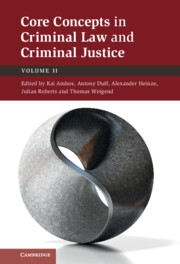Book contents
- Core Concepts in Criminal Law and Criminal Justice
- Core Concepts in Criminal Law and Criminal Justice
- Copyright page
- Contents
- About the Authors
- Abbreviations
- 1 Introduction to Volume II
- Part I Criminal Law
- Part II Criminal Procedure
- 6 Prosecutorial Discretion
- 7 Arrest and Coercion
- 8 Witness Evidence in Pre-Trial and Trial Procedure
- 9 Cooperation Agreements in Germany and the United States
- Part III Criminal Justice
- Index
- References
6 - Prosecutorial Discretion
from Part II - Criminal Procedure
Published online by Cambridge University Press: 24 February 2022
- Core Concepts in Criminal Law and Criminal Justice
- Core Concepts in Criminal Law and Criminal Justice
- Copyright page
- Contents
- About the Authors
- Abbreviations
- 1 Introduction to Volume II
- Part I Criminal Law
- Part II Criminal Procedure
- 6 Prosecutorial Discretion
- 7 Arrest and Coercion
- 8 Witness Evidence in Pre-Trial and Trial Procedure
- 9 Cooperation Agreements in Germany and the United States
- Part III Criminal Justice
- Index
- References
Summary
Within the criminal justice system, the presence or absence of discretion is one of the most important determinants of whether or not the system secures justice for all parties and participants. The question is where justice lies on the spectrum running between criminal law by rules and criminal law by decision. Prosecutors in German and Anglo-American criminal law occupy distinctive roles, as decision-makers, due to both the institutional and normative framework, and the presence of both role duality and role ambiguity. Since prosecutorial discretion in the context of an investigation cannot be separated from police discretion, this chapter covers all discretionary decisions during the proceedings by prosecutors and the police. The chapter thus only deals with discretionary decisions of other agents (such as judicial discretion) from a conceptual perspective since the particular, constitutionally protected position of judges affects their discretion considerably. In the words of the German Constitutional Court: ‘Police forces and public prosecutors do not enjoy independence and cannot be expected – with regard to their investigatory powers and duties – to show the same strict neutrality as judges do.’
- Type
- Chapter
- Information
- Core Concepts in Criminal Law and Criminal Justice , pp. 169 - 218Publisher: Cambridge University PressPrint publication year: 2022
References
- 1
- Cited by

